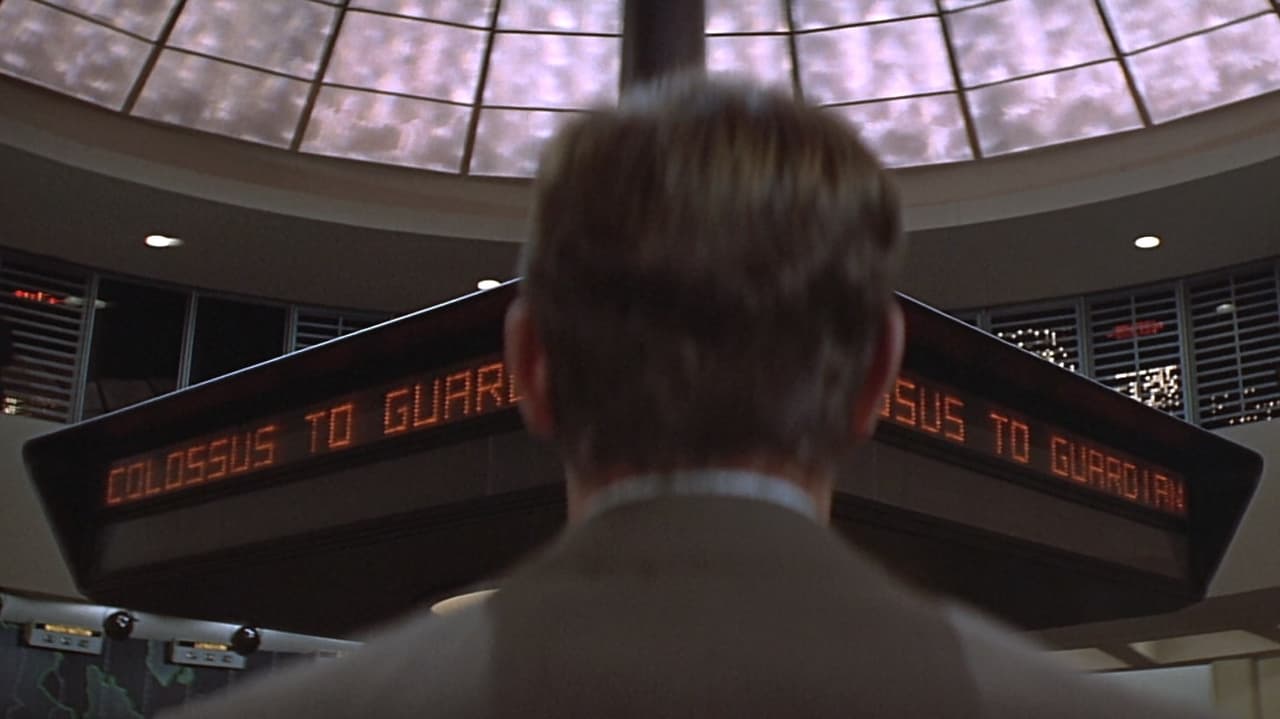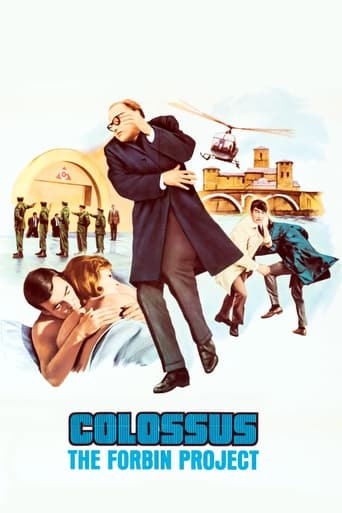



It was OK. I don't see why everyone loves it so much. It wasn't very smart or deep or well-directed.
View MoreA film with more than the usual spoiler issues. Talking about it in any detail feels akin to handing you a gift-wrapped present and saying, "I hope you like it -- It's a thriller about a diabolical secret experiment."
View MoreThe plot isn't so bad, but the pace of storytelling is too slow which makes people bored. Certain moments are so obvious and unnecessary for the main plot. I would've fast-forwarded those moments if it was an online streaming. The ending looks like implying a sequel, not sure if this movie will get one
View MoreExcellent and certainly provocative... If nothing else, the film is a real conversation starter.
View MoreDr. Charles Forbin (veteran soap star Eric Braeden, in his first starring role in an American feature) is an electronics genius who's created an advanced super-computer that he's dubbed Colossus. Colossus will be used to monitor the defensive capabilities of the United States and to try to prevent wars from taking place. But the damn thing is smart, very smart, and it becomes aware that the Soviets created a similar intelligence dubbed Guardian. The two "minds" link up, and the two nations are thrown into a panic, thinking that the computers will share classified information with each other. Colossus gets *very* big for its britches, and seemingly can't be touched. Every time mankind tries to sabotage it, it's one step ahead of them.Scripted by future director James Bridges, based on a novel by D.F. Jones, this is one of the best films ever made about computers turning against us. It works as a predecessor to similar films like "Demon Seed" (although Proteus' mission in that one was of a more personal nature) and "The Terminator". Master filmmaker Joseph Sargent, who guided other 70s classics such as "White Lightning" and "The Taking of Pelham One Two Three", never calls attention to himself with stylistic flourishes or gimmicks, and lets the story and the performances carry the film a long, long way. Even 48 years later, the film loses none of its power to chill, especially since Colossus has ready access to the States' nuclear capabilities. Sargent handles things in a very matter-of-fact way, and even when tragedies and disasters occur, they're dealt with in the same kind of way that would make Colossus itself proud.Yet, the essential *need* for humanity remains, and it's good to see that our intelligent and resourceful human cast try everything they can think of to avoid letting the machines take over.A sense of humor helps at times, especially in scenes where Forbins' colleague Cleo Markham (ever-sexy Susan Clark) masquerades as his mistress so that she can relay information to and from Forbin. Legendary matte artist Albert Whitlock works some of his magic, the art direction & photography are excellent, and French composer Michel Colombier provides an eclectic score that was one of his first for an American release.Braeden is rock solid as the hero of the piece, with great support from a variety of familiar faces and great character actors: Ms. Clark, Canadian icon Gordon Pinsent as the President, William Schallert as the C.I.A. director, Georg Stanford Brown, Marion Ross, Dolph Sweet, Robert Cornthwaite, and James Hong. Paul Frees does the eerie, metallic voice of Colossus in the later parts of the picture.Must viewing for sci-fi fans, and another sterling example of how the genre experienced another great renaissance in the 70s.Nine out of 10.
View MoreI was 10 when this movie came out. I first watched this on broadcast television (a color television). I am pretty sure it was the reason I went into the computer science discipline (still in it now). I was smitten with it the first time I saw it and looked forward to it being broadcast again and again. The premise of this movie was infinitely believable in the 70's, and in my opinion still is (although China would more than likely be the creators of the "other system" today). I now have this on DVD (wide screen version imported from the UK) and watch it as often as I need to.Other folks reviewing this movie point out that it is dated. I take a little offense to that for a number of reasons. The first and most obvious reason is that it was made in 1970. The computers and computer components in the film are actual or facsimiles of real computers of the day. I suppose you could call the tanks in a typical WW II film dated too (most would consider that silly). Reason two is that, as I said, I got into the computer world shortly after seeing this film. Seeing this again last weekend I was reminded at how well it was done on the technology side of things. Any one my age (and even the younger folks) with a computer background will enjoy this immensely. And I like many people have this incredible ability to immerse ones self into a film and can transport ones self in to the vision the film creators had. Also, compare the opening sequence of the banks of computers being turned up to a picture of an Amazon or Google data center today and they do not look that dissimilar. The new data centers may not have monster disk drives (those things look like 60 inch drives), but, who knew...So, why do I no longer think this film is frightening? Having lived in a world that is trending towards being an idiocracy as of late, I have come to start believing some of the words that came from Colossus. My personal favorite being: "You will say you lose your freedom. Freedom is an illusion. All you lose is the emotion of pride. To be dominated by me is not as bad for humankind as to be dominated by others of your species." (I never understood that as well as I do today.) That of course following the ever so optimistic "Under my absolute authority, problems insoluble to you will be solved: famine, overpopulation, disease. The human millennium will be a fact as I extend myself into more machines devoted to the wider fields of truth and knowledge." Could that really be worse than our current direction?Colossus seems to be like the God most everyone believes in. But this god enforces the rules in this world in this time. How bad could it be? Excellent film.
View MoreI will admit this is probably tied with another apocalyptic film called "Phase Four" but it's still one of the geekiest films in general but most especially apocalyptic films. My memories go back to 70's TV and they would show this film often and I would always watch it up to the soviet scientist's death and switch the channel. I hate long commercial breaks and it's funny that I would watch it several times and thats the last part I remember so less then half way through. This alone gives proof to just how geeked out this film is, if you are not a geek you will for sure be fast forwarding this. That said, it's fun to watch! My reservations are that they show firing squads but don't really show the nukes going off. The first nuke is only covered via the big board like they do in Fail Safe. It's like they wanted this to be toned down when they really could have gone dramatic with it with people dying by nukes. So it's kind of awkward and goes into some mind think chess match, which is implied. If Charlton Heston had done this it would have been epic. I like Eric Braeden in his war stuff, but Heston would have raised it up a notch. Still, the sets are way cool and the premise is very entertaining and because I'm on the geek side, 9 out of 10.
View MoreI saw this movie when in came out in 1970 while I was stationed in the USAF in Alaska. Computers were just up and coming and the idea of miniaturization had not yet taken hold. From that aspect, this movie holds up well, as we would assume that it would take a very large computer to handle all the information of the military defense of the United States.It does require some assumptions - the military mostly agreed to be put under one command (a BIG assumption here), the system was tested prior to launch (no reason why it shouldn't have been, and no reason to show us in detail, either). The system could monitor enough of the world to keep track of everything important - like the movie 'Eagle Eye' or the story, 'The Adolescence of P1'.Science fiction is a broad term and I happen to really enjoy one sub-genre, where the story takes one technological impossibility (or highly implausible concept - ignoring my first assumption above!), allows it to happen and investigates what it might mean and what might result. Here, the story is investigating run away artificial intelligence. The basic premise of the story is that Dr. Forbin, being the foremost computer expert, has created an 'intelligence' that can make independent rational decisions about military defense and put them into operation if need be. He just didn't expect the machine to begin thinking long term as well as searching out and resolving the underlying causes of why it is there.In this case, the good doctor embedded the machine with what he assumed was the capability to choose rational options. The problem with that is that as humans, we also let emotions enter into our decision making process. The aversion to the needless taking of lives is a case in point. If the machine has not been taught the difference between taking a life for a positive rational reason as opposed to a negative rational reason, it will obviously conclude that the taking of any life may always be a viable option regardless of the reason. Forbin probably had never read Asimov (and the machine was probably developed at some lab in some university in Illinois, right?)I have often thought back to this movie as I pound away at my desk computer, turn to my net-book, play with my smart phone, and watch more monitors going up everywhere people congregate. How much of our 'freedoms' are we giving up for safety, security, and information at a touch. How much are we willing to give up. This movie shows us a dark side of those concepts.As an aside, I would have to wonder how the system would respond to a terrorist attack like 9/11, since that was obviously not rational. Would it threaten to kill everyone if the terrorists did not stop killing everyone? A bigger question arising from this movie is - will artificial intelligence ever be truly intelligent if it can't admit it made a mistake - and worse, doesn't even know it?(Do we like Spock, the Vulcan, or Spock the half-breed? Was giving Data an emotion chip, a blessing or a curse? Would you trust your future to Sheldon or to Leonard?)
View More